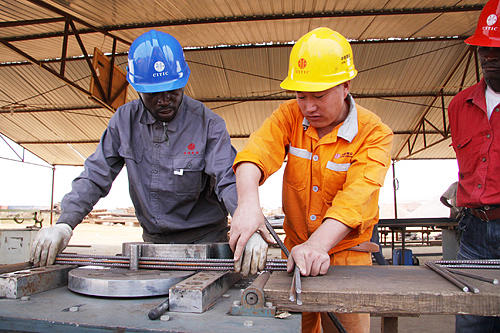|
 |
|
BUILDING CAPACITY: A Chinese worker trains a local worker at a construction site in Luanda, capital of Angola (MU CHANGCHUN) |
Compared with other international organizations, regional organizations in Africa have an outstanding advantage in resolving regional conflicts and maintaining security, because African countries share similar historical, cultural and religious backgrounds. They have a deeper understanding about the causes of the conflicts, and thus have a better chance to come up with solutions. It is essential to bring the role of these organizations into full play.
Along with changes in the international situation, China has expanded its participation in UN peace and security building activities in Africa. For instance, it has sent naval fleets to join the multinational military operations against Somali pirates in keeping with UN Security Council resolutions.
China has been a victim of piracy for a long time. Main purposes of the Chinese escort fleets are to protect Chinese ships passing through the Gulf of Aden and waters off Somalia's coast, ensure the safety of the ships of the World Food Program and other international organizations that carry humanitarian supplies, and try to provide security cover for foreign ships as much as possible. To date, the Chinese Navy has sent 10 fleets to escort missions. While continuing to participate in operations against piracy, China will support the efforts of the international community in establishing special courts to try pirates.
Moreover, China has expressed a clear objection to interference in African countries' internal affairs through international criminal justice agencies. China supports African countries, politically and legally, to resist external interference based on international law.
The fact that all the cases and situations on the International Criminal Court's current agenda involve African countries has raised doubts about the legitimacy of its jurisdiction. Also, the court's issuing of arrest warrants for incumbent African heads of state or government goes against the diplomatic privileges and immunities granted by international law. The practice will produce a lasting negative impact on peace and reconciliation in Africa.
China's position is that a criminal justice system with African features should be established to deal with problems in Africa. To be specific, China calls for the establishment of a regional criminal justice system in Africa, while encouraging African countries to rely on existing domestic judicial mechanisms to punish crimes and make the most of community judicial institutions such as Gacaca courts.
In addition to taking part in international peacekeeping operations in Africa, China supports African countries' efforts to accelerate post-conflict reconciliation. China has helped war-torn African countries restore order, organize elections, reestablish judicial institutions, rebuild military and police forces and reconstruct infrastructure. It also sent Chinese experts to guide African countries' agricultural production and medical teams to provide medical services to Africans.
Behind each war there are complex economic, political, ethnic, religious and cultural roots. Among these factors, the economic factor serves as the major cause of war.
For a long time, African countries have suffered severe economic imbalances, both domestically and among different countries. The minerals of some countries, including diamonds, gold, copper, cobalt, nickel and molybdenum, have long been controlled by warlords. They often use resource revenues to fund civil wars. Some of them even collude with neighboring countries against their own countries for personal and group interests.
If economic problems are not solved and the lives of ordinary citizens are not improved, external help cannot lead African countries to peace and security. Peace treaties may temporarily solve conflicts, but without economic development, they will reoccur after a period of time.
Thus, to realize lasting peace in Africa, it is essential to help African countries develop economically. In this regard, China has made great efforts. After the civil war in Angola ended in 2002, China took an active part in the country's reconstruction. For instance, the Export-Import Bank of China extended large loans to Angola. A number of Chinese enterprises, including the China Civil Engineering Construction Corp., the China Railway Construction Group, and the CITIC Group, a top Chinese financial conglomerate, joined the reconstruction process. China has also carried out similar economic assistance projects in other African countries, such as the Democratic Republic of Congo.
The author is director of the Institute of International Humanitarian Law at the Zhejiang Sci-Tech University | 